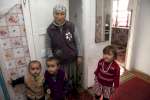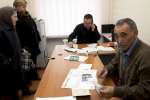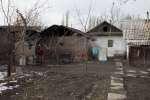- Text size
 |
|  |
|  |
| 
- Français
Statelessness: Falling through the cracks in southern Africa
News Stories, 6 October 2011
MUSINA, South Africa, October 6 (UNHCR) – Luwizhi has been on a paper chase for the last four years – not as a student pursuing higher education, but as someone seeking documents while bouncing between being an asylum-seeker, migrant worker and stateless person.
Luwizhi was born in 1975 to a Zambian father and a Malawian mother who had met and married in Zimbabwe as migrant workers decades ago. He grew up in Zimbabwe and had a Zimbabwean identity card with the word "citizen" stamped on it. For a while, he worked at a mine in Mashonaland East province and headed the worker's committee.
A charismatic speaker, he was courted by two political parties to increase grassroots support ahead of the 2008 elections. But the attention soon turned ugly, with one party following and visiting him at odd hours.
In mid-2007, he fled to his mother's village south of Harare, Zimbabwe's capital. When he arrived, she told him a group of men had come to the homestead looking for him. A quick description confirmed that these were the same men who had sought him out the night before at his work place. He then escaped to Musina, South Africa's northernmost border town with Zimbabwe, crossing illegally in the dead of night.
As an asylum-seeker in South Africa, Luwizhi worked as a gardener. In 2010, the South African government started the Zimbabwe Documentation Project to regularize the status of thousands of qualifying Zimbabwean migrants. It also allowed asylum-seekers to change their status and obtain work, business or study permits valid for four years.
Luwizhi's employer insisted that all his workers change their status and obtain work permits. Luwizhi didn't argue with this as he saw it as a chance to explore better job opportunities in the mines surrounding Musina. Soon after, he decided to apply for a passport with the Zimbabwean authorities in South Africa.
"I got the shock of my life when they told me that I ceased to be a Zimbabwean citizen in 2002, with the implementation of the 2001 Citizenship of Zimbabwe Amendment Act," he said in disbelief. The law forbids dual citizenship in Zimbabwe and requires people with a claim to foreign citizenship – even if they are not aware of it – to renounce it in order to keep their Zimbabwean status.
"The law on citizenship in Zimbabwe has become increasingly restrictive," said Rosalind Elphick, a lawyer working in Musina for UNHCR's partner, Lawyers for Human Rights (LHR), on the agency's regional statelessness project. "The only claim Luwizhi has is that he was born on the territory. In Zimbabwe, he doesn't qualify at all for citizenship because the Constitution requires him to have at least one blood relative who is Zimbabwean as a parent or grandparent – and he has neither."
Luwizhi lamented, "So who am I? Where do I belong, because Zimbabwe is the only country I have ever known as home? That my parents were from other countries is meaningless because I know of no family in Zambia or Malawi."
By this time he had also surrendered his asylum application, rendering him undocumented and stateless in South Africa. He could have been arrested for breaking immigration laws, but luckily his asylum-seeker status was reissued after LHR appealed to the Musina Refugee Reception Office.
South Africa is not party to the 1954 Convention relating to the Status of Stateless Persons or to the 1961 Convention on the Reduction of Statelessness. However, the Department of International Relations and Cooperation appears to have taken an interest in the issue.
'They have given LHR an audience on the matter and have really been cooperative, interested in the statistics we have and wanting to hear our stories," said Elphick. "Separately, we've managed to uncover several groups of people who are stateless or at risk of becoming stateless in this country."
LHR is working hard to present its findings to South Africa's Department of Home Affairs, the ministry charged with managing immigration as well as handling refugees and asylum-seekers.
In the meantime, Luwizhi is grateful that he can approach LHR for counselling and advice. "They're really interested in my situation and I have every confidence that somewhere along the line, they will help me overcome this problem," he said.
By Pumla Rulashe
In Musina, South Africa





































